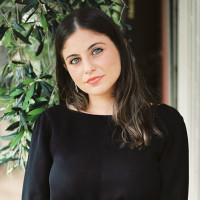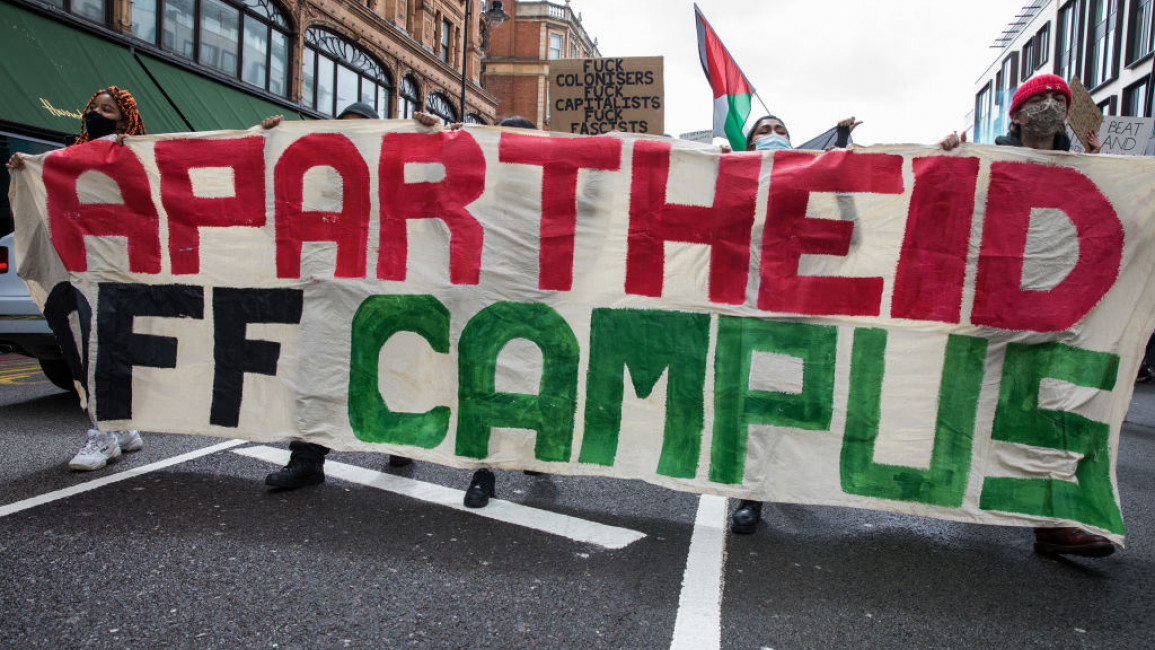
Lara Sheehi: Stop silencing Palestine solidarity in academia
We are currently witnessing a global silencing of pro-Palestinian voices across academic institutions, with Assistant Professor Lara Sheehi becoming the most recent target of the Zionist lobby’s smear campaigns.
I first came across Lara’s work when she co-authored Psychoanalysis Under Occupation: Practising Resistance in Palestine. The book is unapologetic in its truth telling and a work of active, material decolonisation. It was thus unsurprising, albeit heart-breaking and infuriating, when I learned that Lara was under investigation by her employer – George Washington University – based on a complaint filed by StandWithUs, an organisation who self-proclaims its “love” for the genocidal, settler colonial state.
Of course something as simple as the truth would threaten an organisation committed to upholding an illegitimate state that’s built on lies.
''Academic institutions within the Israeli settler colonial project manufacture violence and export their structures and tactics across the globe. In their inception, Israeli institutions are built on stolen Palestinian land – Tel Aviv University is built atop the demolished Palestinian village of Sheikh Muwannis, and Ariel University is located within an Israeli settlement.''
Lara’s experience comes off the back of former Human Rights Watch (HRW) chief being denied a Harvard fellowship due to “anti-Israel bias”. These examples are only the most recent in what has been a marked increase in smear campaigns orchestrated by the Zionist lobby and its supporters over the last year. In the UK, Dr Shahd Abu Salama was repeatedly investigated and suspended by her employer, Sheffield Hallam University.
Months after Shahd was exonerated, Shaima Dallali was dismissed from her role as president of the National Union of Students (NUS). Shaima’s dismissal is the first of an NUS President in the organisation’s 100-year history, reflecting the decimisation of the union's democratic processes and a bowing to organisations such as UK Lawyers for Israel (UKLFI) and the openly Zionist Union of Jewish Students (UJS).
In Australia, the University of Melbourne Student Union (UMSU) passed a motion in May 2022 entitled UMSU Stands with Palestine – BDS and Solidarity Policy, and students who were involved in drafting and passing it were consequently subjected to bullying, harassment, and intimidation both privately and publicly.
All these campaigns, whether in the metropole of Western imperialism (the UK) or in the settler colonies of the US and Australia, are underpinned by accusations of antisemitism that are based on the IHRA definition – a definition that has been widely critiqued, including by its drafter, for conflating anti-Zionism with antisemitism.
The widespread and increased uptake of the IHRA definition is catalysed by organisations like StandWithUs and directly correlates to the increased weaponisation of antisemitism to legitimise Israel’s settler colonial project. Anti-Zionist Jewish individuals and organisations have continued to insist that the conflation with anti-Zionism obscures the real meaning of antisemitism. Indeed, antisemitism is a legitimate threat to Jewish safety and such conflation prevents meaningful action when it comes to combating its reality.
Let’s be clear, motions in support of Palestine on campuses don’t make Jewish students unsafe, they make Zionist students uncomfortable.
— Lana Tatour (@Lana_Tatour) May 26, 2022
The Zionist lobby and its supporters have strategically reduced each target of their smear campaigns to individuals: Lara, Shahd, Shaima, and those students involved in drafting and passing the UMSU motion. In doing so, the Zionist lobby is attempting to atomise Palestinians and reduce the “problem” to a small number of people within the academy.
There are armies that stand with and behind these individual faces, all unified by a commitment to Palestinian liberation, and this is what has driven the success of our counter-campaigns: the UMSU motion remains, Shahd was exonerated, and Lara will be too.
These wins are only possible by the power of an organised movement, and it is the existence of this movement that the Zionist lobby is working to invisibilise.
Academic institutions within the Israeli settler colonial project manufacture violence and export their structures and tactics across the globe. In their inception, Israeli institutions are built on stolen Palestinian land – Tel Aviv University is built atop the demolished Palestinian village of Sheikh Muwannis, and Ariel University is located within an Israeli settlement.
Israeli academic institutions enable the perpetration of war crimes by the settler colonial military through supporting the development of weapon systems and military doctrines. Students who attend Israeli academic institutions are subject to repression when it comes to Palestine – a recent, prominent example is that of a Masters student at Haifa University who’s degree was revoked because he researched the Tantura massacre.
Students affiliated with the Israeli military are rewarded within academic institutions – Tel Aviv University, Ben Gurion University, and Haifa University offer scholarships to students who served in the military during the 2014 attacks on Gaza.
At the same time, the Israeli regime suffocates and isolates higher education institutions in the West Bank and Gaza. in March 2022, the Israeli government instituted a policy on who can study and teach at Palestinian universities and for how long.
Despite this, Palestinian university campuses continue to be a hotbed for student organising, but Palestinian students are regularly met with violence, arrest and imprisonment for their organising efforts. All the while, academic institutions in the West remain obsessed with the farcical notion of impartiality and objectivity while upholding Zionist logics, partnering with Israeli academic institutions, and dismissing our calls for academic boycott.
Student activism on university campuses has a history longer than any Israeli institution. In Latin America, traditions of student organising began in the 19th Century. Most notably, the University Revolution of 1918 which started in Argentina and spread across Latin America, calling for the democratisation of universities.
In the 1970s, South African students were pivotal in the anti-apartheid movement. Most famously, the Soweto Uprising of 1976 describes a series of student-led protests. More recently, the 2015 Rhodes Must Fall protest movement was spearheaded by students at the University of Cape Town and led to a wider movement to ‘decolonise’ higher education.
However, while universities are more than happy to start adopting decolonisation as a buzzword, they miserably fail when it comes to taking material action. At a most basic level, universities are required to fulfil their duty of care towards their staff and students by ensuring they are safe from harassment, intimidation, censorship, and false accusations. Yet, these institutions continue to support Zionism over anticolonialism and justice, drawing on false notions of Jewish safety that, in the words of Palestinian academic Lana Tatour, confuse Jewish safety with Zionist discomfort.
There was a time when universities produced knowledge in the service of justice and revolution. Today, academic institutions serve as sites of violence against Palestinian and pro-Palestinian voices. We must demand better because unless we do, there will be more Laras, Shahds and Shaimas.
Jeanine Hourani is a Palestinian organiser, writer, and researcher. She is an ESRC funded PhD candidate at the University of Exeter researching women, resistance, and mental health in Palestine.
Follow her on Twitter:@jeaninehourani
Have questions or comments? Email us at: editorial-english@newarab.com
Opinions expressed here are the author's own, and do not necessarily reflect those of their employer, or of The New Arab and its editorial board or staff.




